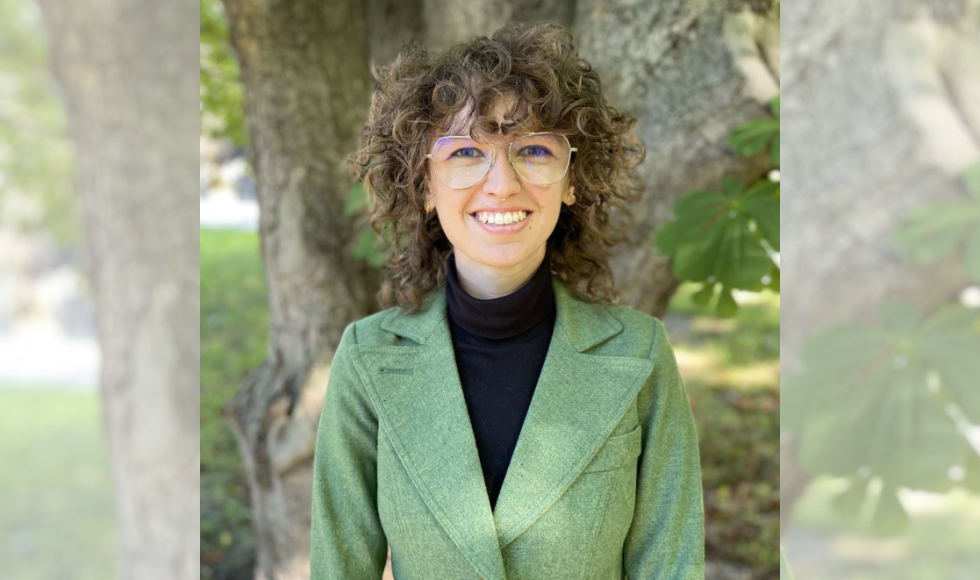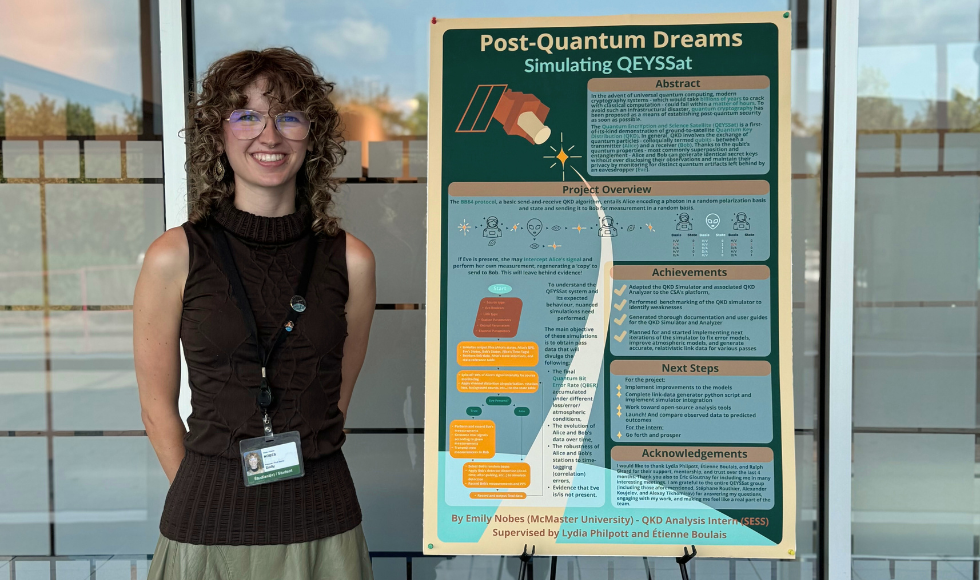Quantum physics, climate action and community: Meet Emily Nobes, McCall MacBain Scholar

Nobes was recently named a McCall MacBain Scholar, receiving Canada’s largest leadership-based scholarship for master’s and professional studies.
The wall behind Emily Nobes is covered in a collage of posters from her experiences over the last few years.
It includes literary works like Dante’s Inferno and The Picture of Dorian Gray; posters from designer John Fluevog’s magazines (she’s a fan of the shoes); and restaurant cards from her time in Montreal.
The fifth-year McMaster student has just earned concurrent bachelor’s degrees in Engineering Physics and Society, and English and Cultural Studies. During her time at McMaster, she’s co-founded two student clubs, both aimed at increasing opportunities for students, and worked on quantum projects for the Canadian Space Agency.
Nobes has been named a recipient of the prestigious McCall MacBain Scholarship, Canada’s largest leadership-based scholarship for master’s and professional studies.
As she approaches graduation, Nobes has been reflecting on how the McMaster community has supported her over the years and helped her get to this remarkable achievement.
Growing up in Burlington, that support started from a (very) young age — Nobes was born at the McMaster Children’s Hospital. In high school, she participated in a Mac Eng challenge called the DECA Grit Tank, then received an Undergraduate Summer Research Award.
These early exposures helped her choose Mac for her undergrad. “What it really solidified for me is that I’m not even a student yet, and I’m already being so supported by this community,” Nobes said. “I’ve already been given opportunities… and I’ve kind of had a bit of a taste of what the community is like.”
Since then, “every day has reaffirmed” that the McMaster experience encompasses care and opportunity.
Nobes was admitted into the engineering program, and decided in her second year that she wanted to do a degree in the humanities as well.
It took some work to figure out all the logistics, she said, but the undergraduate chair of her program was willing to sign off on her taking eight classes (a full-time course load is typically five classes).
It’s a testament to “the freedom that we have here,” and the willingness of the community to support lofty goals, Nobes said.
From professors to fellow students to administrative staff, “this culture that we have here is one of community and collaboration … I just continue to know that while I’m here at McMaster, I am constantly enabled to do what I want to do and to push forward,” Nobes said.
That includes, in her first year, co-founding the Climate Action Constituency, a student group that provides environmental consulting services to small businesses.
The CAC came from wanting provide tangible, action-oriented steps for climate action, and feeling that students had a unique opportunity to provide their knowledge. Through this initiative, Nobes worked with eight stakeholders, and at one point, the CAC had approximately 40 undergraduate researchers working on these projects.
“We became very well connected with the sustainability office at McMaster and the Eco Hamilton Collective,” Nobes said. “It really opened our eyes up to this world of sustainability organizations.”
In her third year, she co-founded the McMaster Quantum Club to provide students with a chance to gain experience in a field that needs more labour, but has a high barrier to entry.
“Most of the quantum internships that are out there require a graduate degree already,” Nobes said. “But at the same time, the Canadian quantum industry is struggling because we don’t have enough labour to sustain what we could be doing.”
Nobes secured funding for optical equipment and resources to establish Canada’s first quantum technical student team, and the club has been building a network with quantum clubs at other schools.
“We’re kind of figuring out how to make this more accessible to undergrads, to be able to push themselves and push this notion of, ‘undergrads don’t really have a space in this industry.’ Because I think that we do,” Nobes said.

All of this shaped her ability and made her a serious contender for the McCall MacBain Scholarship.
Nobes was working on her capstone project (a homodyne detector, to use as a quantum random number generator) when she got the news that she’d made it to the finalists.
She ran into the hallway of the Burke Science Building to take the call. “I stayed out there for like 45 minutes, calling my mom and everyone,” Nobes said.
“It was exciting to make it as far as I had at semifinals, and now it’s exciting to be moving forward.”
Nobes graduates this spring. After Mac, she’s accepted an offer from McGill’s Department of Physics for a master’s program. She’s going to be working on one of the first quantum projects there. The McCall MacBain Scholarship covers tuition and fees for an eligible master’s program or a second-entry professional undergraduate program at McGill, a living stipend of $2,300 CAD per month during academic terms, a one-time relocation grant, and options for summer funding.
McCall MacBain Scholars also participate in a leadership development program, connect with mentors and advisors, and attend a breadth of workshops and talks.
Nobes is excited for the next chapter, but it’s bittersweet, too, to leave the university that was not just her birthplace but has also been her home for the last five years.
But she plans to continue with “the ideas of collaboration and support that McMaster has instilled in me.”
McMaster “has such a reputation for teamwork and for community support among students,” Nobes said. Supporting people, sharing your work, and helping people when they ask for help is “part of existing in a community.”
“McMaster has really solidified that for me,” she said. “Every time I’ve needed help, I have gotten it so easily here, and I hope that I will be able to eventually be that easy help for someone.”
“McMaster has really taught me that.”


